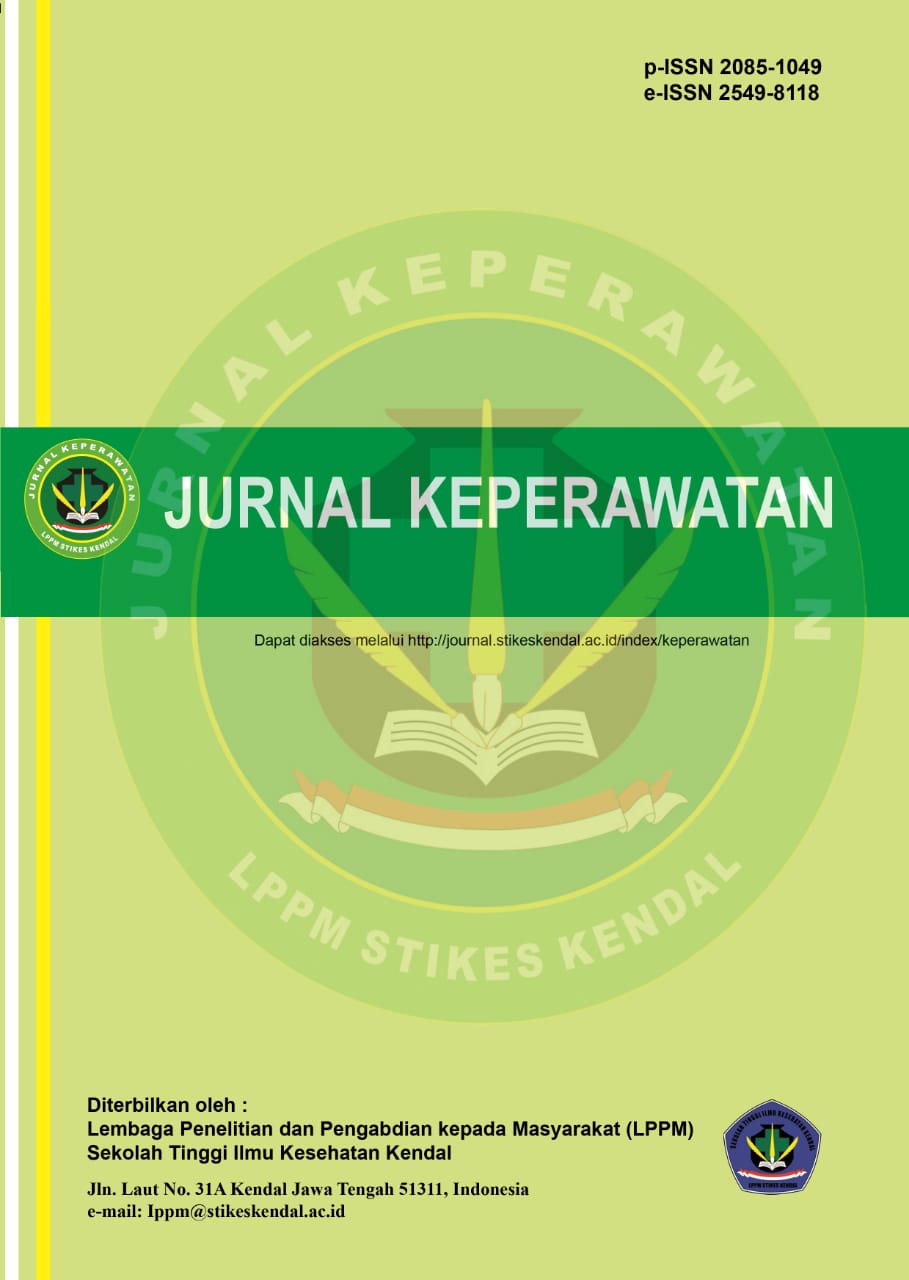Pengalaman Pasien Terkonfirmasi Covid-19 selama Menjalani Perawatan di ruang Isolasi Covid-19 di Kota Medan, Sumatera Utara
DOI:
https://doi.org/10.32583/keperawatan.v14iS1.20Keywords:
pasien terkonfirmasi COVID-19, pengalaman, perawatan, ruang isolasi COVID-19Abstract
Pasien terkonfirmasi COVID-19 yang menjalani isolasi akan menimbulkan rasa kesepian, kecemasan, kebosanan, kesedihan, stres dan trauma sehingga dapat memicu respon fisiologi yang dapat menyebabkan penurunan imunitas serta memperburuk kondisi kesehatan pasien terkonfirmasi COVID-19. Jenis penelitian adalah kualitatif dengan pendekatan fenomenologi deskriptif. Partisipan dalam penelitian ini 13 orang yang dipilih dengan teknik purposive sampling. Metode pengumpulan data dengan wawancara mendalam secara langung dan wawancara tidak langsung dengan durasi 50-60 menit. Alat pengumpulan data berupa kuesioner data demografi, panduan wawancara, catatan lapangan dan alat perekam suara. Metode analisa data mengunakan pendekatan Colaizzi. Hasil penelitian ditemukan lima tema yaitu respon fisiologi, respon psikologi, mekanisme koping, kebutuhan memperoleh dukungan selama menjalani perawatan COVID-19, dan dinyatakan negatif COVID-19. Pengalaman pasien terkonfirmasi COVID-19 mengalami berbagai tantangan. Mayoritas partisipan menyatakan memiliki respon negatif saat menjalani perawatan diruang isolasi COVID-19 maka dibutuhkan mekanisme koping yang stabil serta dukungan keluarga, teman, dan masyarakat. Peranan tim medis dalam pemberian intervensi klinis dan kualitas pelayanan sangat berpengaruh terhadap proses pemulihan pasien terkonfirmasi COVID-19. Pemberian perawatan secara holistik dari tim medis dapat meningkatkan pendekatan manajemen diri yang membantu pasien terkonfirmasi COVID-19 semangat melawan penyakit yang dialami.
References
Aungsuroch, Y., Juanamasta, I. G., & Gunawan, J. (2020). Experiences of patients with coronavirus in the covid-19 pandemic era in Indonesia. Asian Journal for Public Opinion Research, 8(3), 377–392.https://doi.org/10.15206/ajpor.2020.8.3.377
Care, P., & Resource, N. (2020). Living with Covid-19 ( Long Covid ) and Beyond Community and Primary Care Nursing Resource. 19, 1–19.
Dhama, K., Khan, S., & Sircar, S. (2020). Coronavirus Disease 2019 – COVID-19. April.https://doi.org/10.20944/preprints202003.0001.v2
Gunawan, J., Juthamanee, S., & Aungsuroch, Y. (2020). Current Mental Health Issues in the Era of Covid-19. Asian Journal of Psychiatry, 51(September), 1–3. https://doi.org/10.1016/j.ajp.2020.102103
Kaligis, F., Indraswari, M. T., & Ismail, R. I. (2020). Stress during COVID-19 pandemic : mental health condition in Indonesia. 1–6.
Kavurmaci, M., Dayapoğlu, N., & Tan, M. (2020). Effect of music therapy on sleep quality. Alternative Therapies in Health and Medicine, 26(4), 22–26.
Kemenkes RI. (2020). Pedoman pencegahan dan pengendalian Coronavirus Desease (COVID-19) Kementerian kesehatan RI. https://infeksiemerging.kemkes.go.id
Kemenkes RI. (2021). SITUASI TERKINI PERKEMBANGAN NOVEL CORONAVIRUS (COVID-19). https://infeksiemerging.kemkes.go.id/document/download/cover
Korstjens, I., & Moser, A. (2018). Series: Practical guidance to qualitative research. Part 4: Trustworthiness and publishing. European Journal of General Practice, 24(1), 120–124. https://doi.org/10.1080/13814788.2017.1375092
Kumar, S., Kuljeet, S., Anand, S., Juneja, A., & Kumar, R. (2020). Neurological Problems in COVID-19 Pandemic.
Munhoz, R. P., Pedroso, J. L., Nascimento, F. A., De Almeida, S. M., Barsottini, O. G. P., Cardoso, F. E. C., & Teive, H. A. G. (2020). Neurological complications in patients with SARS-CoV-2 infection: A systematic review. Arquivos de Neuro-Psiquiatria, 78(5), 290–300. https://doi.org/10.1590/0004-282x20200051
Olufadewa, I. I., Adesina, M. A., Oladokun, B., Baru, A., Oladele, R. I., Iyanda, T. O., Ajibade, O. J., & Abudu, F. (2020). “I Was Scared I Might Die Alone”: A Qualitative Study on the Physiological and Psychological Experience of COVID-19 Survivors and the Quality of Care Received at Health Facilities. International Journal of Travel Medicine and Global Health, 8(2), 51–57. https://doi.org/10.34172/ijtmgh.2020.09
Polit & beck. (2014). Essential of Nursing Research: Appraising Evidence for Nursing practice (8th ed.).
Rothan, H. A., & Byrareddy, S. N. (2020). Since January 2020 Elsevier has created a COVID-19 resource centre with free information in English and Mandarin on the novel coronavirus COVID- 19 . The COVID-19 resource centre is hosted on Elsevier Connect , the company ’ s public news and information . January.
Sun, T., Wei, L., Shi, S., Jiao, D., Song, R., & Ma, L. (2020). Since January 2020 Elsevier has created a COVID-19 resource centre with free information in English and Mandarin on the novel coronavirus COVID- 19 . The COVID-19 resource centre is hosted on Elsevier Connect , the company ’ s public news and information . January.
Syam, A. F. (2021). Gastrointestinal disorders in COVID-19 patients: a great imitator. Medical Journal of Indonesia, 30(2), 166–169. https://doi.org/10.13181/mji.bc.204960
Umarella, S., Farid, M., & Ab Rahman, Z. (2020). Medicine and al-quran recital approaches used on covid 19 patients: A systematic review. Systematic Reviews in Pharmacy, 11(12), 1163–1170. https://doi.org/10.31838/srp.2020.12.170
Yang, X., Yang, X., Kumar, P., & Cao, B. (2020). Social support and clinical improvement in COVID-19 positive patients in China. Nursing Outlook, 0, 1–8.https://doi.org/10.1016/j.outlook.2020.08.008.
Downloads
Published
How to Cite
Issue
Section
License
Copyright (c) 2022 Jurnal Keperawatan

This work is licensed under a Creative Commons Attribution-NonCommercial-NoDerivatives 4.0 International License.




